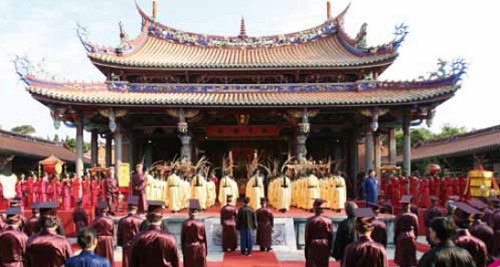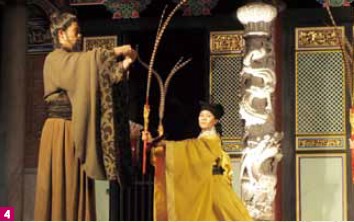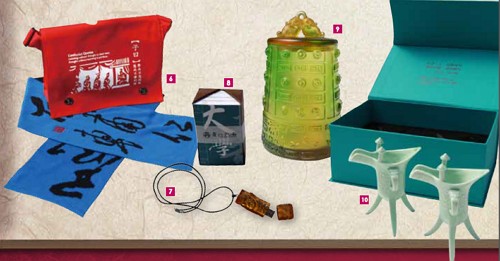The New Confucianism of Taipei Confucius Temple
Ancient Rites.Tea Fragrance – Innovative Cultural Experiences in New Style You may not have known that in this solemn place where the Great Sage is venerated, each and every Saturday night you can come watch a show! Following the practice elsewhere in Taiwan and overseas where heritage sites are used as attractive stages, plays telling stories of history and traditional music and dance presentations are staged here. Until Oct. 1 you can see the Taipei Confucius Temple Situation Play—The Legend of Confucius Temple Trilogy being presented by Six Art Theatre, the first such history-focused show presented in a historical site. Currently on show is the second part of the trilogy, Child's Time-Traveling Journey: Hauhau, the Fairy Orchid, and Confucius, starting Sa Beyond the theatrical presentations, you can also take advantage of the ongoing program entitled Revitalizing Confucianism—A Journey through the Confucius Temple: Display, Presentation, and Experience, which presents ancient Confucian rites and ceremonies in authentic form. This program is one component of the city's Taipei Confucius Temple Historic District Tourism Revitalization Project. Until Oct. 30, you can take in the "Temple Circling Ritual", an incense-prayer ceremony, daily before 9 a.m., with dancers holding ancient-style ceremonial instruments leading visitors in with their temple-supplied wooden "veneration blessing cards", moving about the complex and conducting Confucius veneration rites. From 9 to 9:30 a.m. is the Ya Yue Dance performance. This features an adaptation of the classic Yi Dance performed during Confucius-veneration rites in ancient China, with sacrifices of splendid color and solemnity made to Heaven and Earth, the ancients, and the temple itself. These are today sights rarely seen, and this an opportunity not to be passed up on. In the afternoon is the Gentleman's Tea Ritual, with 50 applicants accepted each time for the activity, which is free. It is held Tue~Fri and on Sunday at 3 p.m. (there is also a session on Sat and Sun at 10 a.m.). At each session, a master of the teadrinking art teaches visitors the proper time-honored procedures that form the tea brewing and drinking ritual. As you sit in the quiet complex contemplating your hot warming tea, your teacher's instructions, and the special scene you find yourself in, you may well be carried back to your old school days and contemplate once more the time-honored teacher-student relationship. A good idea is to come earlier in the afternoon before the tea-ritual session to go through the temple complex with the assistance of the audio-guide facilities. It's free, and you have the choice of service in English, Chinese, Japanese, or Korean. The tour takes about an hour, and the content includes a comprehensive introduction of the temple's spaces, the architecture and workmanship, the stories of Confucius and of his disciples, and other matters of interest—including introduction of other key nearby attractions such as Baoan Temple and Dalong Night Market. A Grand Annual Gathering – The Confucius Ceremony The elaborate Confucius Ceremony is the event of the year at Taipei Confucius Temple, conducted on the birthday of the Great Sage, Sep. 28, named Teachers' Day in his honor. Authentic ancient rites first carried out 2,000 years ago are faithfully reenacted— key rituals carried out in all dynasties, heavily laden with meaning and symbolism. The eight musical instruments of classical times are played, present the elegant Dacheng Suite Confucius ceremony music from the Song Dynasty. The Yi Dance component of the Ya Yue Dance is presented, which originally took form at the Ming Dynasty court. There is then a grand ceremonial opening of the gates, receiving of the spirits, sacrificial feast presentation, incense ritual,"three offerings" ceremony, and sending off of the spirits— a program of 37 separate ritual components. Each year many visitors from Taiwan and overseas attend, among them research groups studying Confucianism. Novel and Elegant Creative Souvenirs Do you know what the Confucian "Six Arts" are? Do you know what the classical musical instruments of the Confucius Ceremony are? Bringing together modern-era technology and ancientera, the temple management has introduced the Multimedia Six Arts Experience Exhibit, providing an interactive experience that will educate you about the Six Arts, which for a very long time were close to vanishing from the historical scene. Today they are once again being returned to their rightful place as central icons of the Confucianist culture. Work is now going on to change the night face of the temple complex, soon to be completed, and starting in Oct. an enjoyable series of night-time activities is being unveiled, lifting the night-curtain on the complex and bringing a whole new type of visitor experience. The temple now also offers a range of souvenirs as well—and very nice ones indeed. The designers turned to classic Confucian themes: artifacts used in sacrificial rites, classical musical instruments, the Analects, the Four Classics, and other iconic symbols. The souvenirs are 9 everyday-use items, including stationery and clothing/accessories. One is the Liuli Zhong Container; the zhong is an ancient Chinese bronze bell, one of the classic Confucian-ritual musical instruments. The Green Ceramic Ancient Wine Vessel comes in a set of two; this type of wine vessel was popular during the Xia, Shang, and Zhou dynasties, and an important ritual item when making a libation to honor Confucius. The vessels here are replicas made of penetrating celadon. You'll no doubt also admire the "Confucius Says" Book Bag and Analects Calligraphic Scarf , both of practical everyday use and defining you as a person of distinctive character. Perhaps the stationery souvenir items best capture the scholarly essence of Confucianism's spirit. You'll find this "essence" actually printed on paper with the Four Books Memo Pads , which have quotes from Confucius printed on them and are bound in ancient style, giving them a chic retro look. For the Liu Li Tong Tian Concealed Flash Drive, a type of glass is fired in the shape of a tube, imitating the ceramic tubes you see atop Confucian temples, themselves imitations of ceramic tubes once used to protect books. Legend has it that China's first emperor, Qin Shi Huang , burned books and buried scholars alive, and these tubes were used to protect and hide the Chinese heritage. The souvenir tubes are worn as a necklace; remove the cap and your flash drive is ready to use. Since when shopping, you'll have already attended the Confucius Ceremony, the Eight Sound Coasters and Five Sheng Bookmarks are also good ideas. The "eight sounds" are eight kinds of traditional Chinese instruments distinguished by the different materials used to make them; for the souvenirs, three instruments have been chosen, the ocarina (clay), the xiao (bamboo) and the zhong (metal), and etched onto pliable rubber, using a modern material to reignite the beauty of ancient instruments. The five types of sheng are the five types of performers in the Confucius Ceremony, playing a key role in each part: the musicians perform the drums, the singers sing praise, the dancers and deacons follow the flag leaders into the ceremony. In addition to the five shengs, the entire ceremony is overlooked and orchestrated by the presentation officers. These wonderfully crafted souvenirs can be purchased at two locations: the sales outlet on the first level of Taipei Confucius Temple's Minglun Hall, and at the souvenir shop at Taipei City Hall. If memories can take material form, these are the perfect way to memorialize your Confucius Temple experience. Add: 275 Dalong St.  Taipei life is blessed with the ability to make the old into something completely new while faithfully preserving its essence. In this way, the story of things old continues to move those "new" to the world. A prime example of this is the Taipei Confucius Temple, a National Historical Relic of the Third Rank, popular with local and overseas visitors looking to witness the carrying out of authentic Confucian rites and ceremonies. The temple complex has undergone a thorough renovation in recent years, restoring its true luster, and at the same time many interactive design elements have been introduced, both in terms of hard and soft facilities. The result is maximized enjoyment and enlightenment at all times, but especially should you come to the events annually held on Teachers' Day, Sep. 28.
Taipei life is blessed with the ability to make the old into something completely new while faithfully preserving its essence. In this way, the story of things old continues to move those "new" to the world. A prime example of this is the Taipei Confucius Temple, a National Historical Relic of the Third Rank, popular with local and overseas visitors looking to witness the carrying out of authentic Confucian rites and ceremonies. The temple complex has undergone a thorough renovation in recent years, restoring its true luster, and at the same time many interactive design elements have been introduced, both in terms of hard and soft facilities. The result is maximized enjoyment and enlightenment at all times, but especially should you come to the events annually held on Teachers' Day, Sep. 28.  turdays at 7:30 p.m. Come sit in a history-rich venue before a temple hall, following the young actors as they lead you through time, and learn more of the timeless importance of the Confucian culture and the keys to understanding that Confucius provided to all.
turdays at 7:30 p.m. Come sit in a history-rich venue before a temple hall, following the young actors as they lead you through time, and learn more of the timeless importance of the Confucian culture and the keys to understanding that Confucius provided to all. This year is the centenary of the Republic of China, and to celebrate, bigger things than usual have been planned for the Confucius Ceremony and the Taipei Confucius Temple Cultural Season that is wrapped around it. A series of activities will bring historical sites and heritage vividly to life, and as you are no doubt intent on taking part, you can find more details on the Taipei Confucius Temple Confucian Culture website at www.ct.taipei.gov.tw.
This year is the centenary of the Republic of China, and to celebrate, bigger things than usual have been planned for the Confucius Ceremony and the Taipei Confucius Temple Cultural Season that is wrapped around it. A series of activities will bring historical sites and heritage vividly to life, and as you are no doubt intent on taking part, you can find more details on the Taipei Confucius Temple Confucian Culture website at www.ct.taipei.gov.tw. Information
Taipei Confucius Temple
Tel: (02) 2592-3934
Hours: Tue-Sat 08:30-21:00, Sun and national holidays 08:30-17:00 (closed Mon)
Website: http://www.ct.taipei.gov.tw/en-us/Home.htm
Transportation:
MRT: Danshui Line to Yuanshan Station, take Exit 2, walk approx. 8 minutes
Bus:
1. Dalongdong Baoan Temple stop: 2, 41, 215, 246, 288, 669, 811, Red 33
2. Jiuquan St. stop: 2, 9, 41, 215, 288, 669, 811, Red 33
3. Kulun St. stop: 2, 9, 41, 215, 246, 288, 669, 811, Red 33

![Taiwan.gov.tw [ open a new window]](/images/egov.png)
